Our view at Stack - Pipedrive is a robust CRM platform, offering automation, contact data collection, webhooks, AI-powered sales assistant, email communications, email marketing, and customisable sales pipeline workflows.
Unifying your customer relationship management (CRM) and email marketing tools has huge business benefits. It can align sales and marketing, improve lead quality and accelerate your pipeline.
With so many platforms available, narrowing down the right one for your unique business can take time and effort.
In this article, we’ll explain how to choose the best CRM with email marketing software and recommend five of the top tools to consider.
5 best CRM software with email marketing automation
Many CRM tools exist without email marketing platforms. However, today’s sales and marketing teams want more power and insights in fewer dashboards.
We’ve chosen the five most popular CRMs with email marketing features designed for sales leaders and small business owners to enhance your email marketing strategy using CRM data.
1. Pipedrive
Pipedrive’s award-winning, customizable CRM is perfect for companies of all sizes, from small businesses to enterprises. Its combination of CRM and email marketing functionality makes it a top choice for businesses looking to streamline operations and enhance customer engagement.
Pipedrive is well-known for its intuitive and user-friendly interface, cutting down the learning curve so teams can get up and running quickly. Its visual pipeline and high-level overviews help you easily track deal progress, sales activities and customer interactions, so nothing slips through the cracks.
Here are some of Pipedrive CRM’s key features:
-
Comprehensive lead management functions (from generation to lead nurturing)
-
Advanced AI CRM and automation features (e.g., AI email generator and smart integration recommendations)
-
Detailed insights and sales reports with colorful charts and graphs
-
A mobile app for iOS and Android for on-the-go sizes
-
A dedicated support team for 24/7 help (plus a knowledge base, blog articles and video tutorials for self-service options)
-
An extensive marketplace of over 400 integrations that you can add as you scale
Pipedrive is highly customizable, so you can set up your unique pipeline to your exact specifications and create custom fields to fit your business needs.
Pipedrive offers a 14-day free trial, allowing you and your team to experience the whole platform.
Pipedrive’s email marketing functionality
Unlike many other tools, Pipedrive’s email marketing tool, called Campaigns, is included as an add-on and priced per company rather than per user. The feature lets you engage customers with beautifully designed emails right from your CRM.
For example, you can keep in touch through email newsletters, create welcome emails for new subscribers or send discounts to disengaged subscribers.
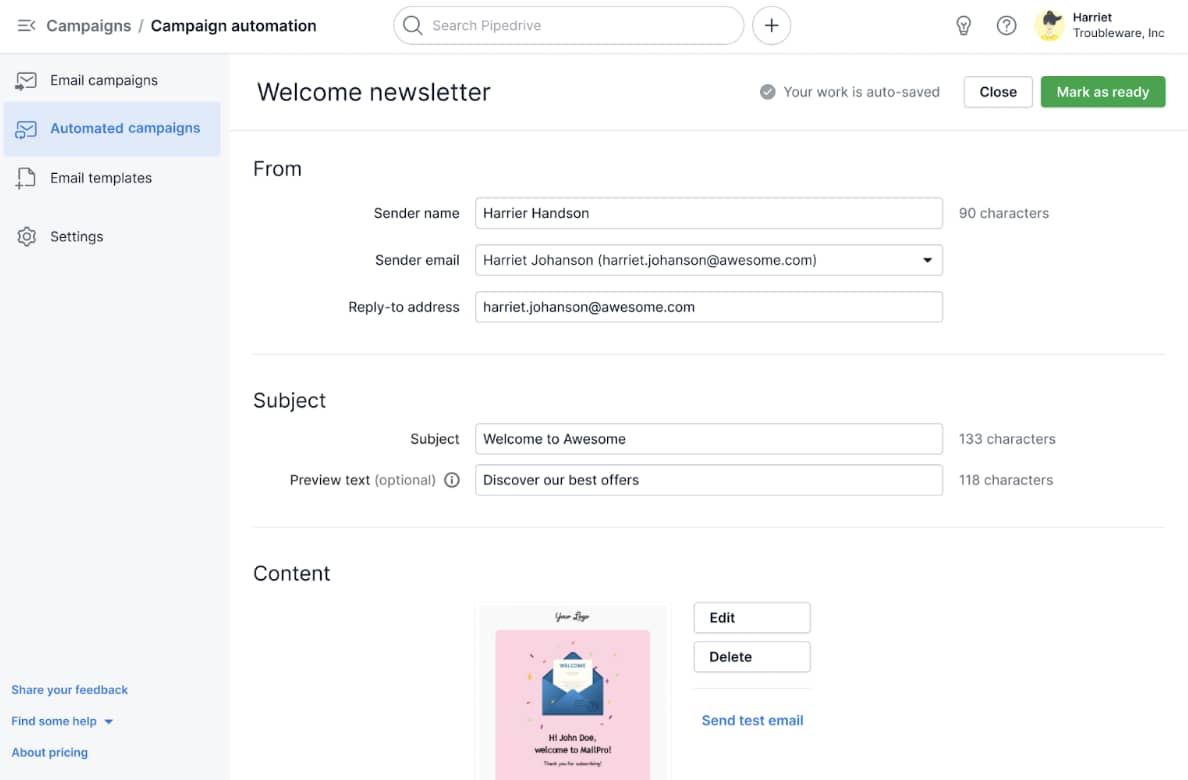
As Campaigns is hosted right in the CRM where all your rich customer data is stored, you have a lot of information to group your contact list into different segments for highly personalized messaging.
For instance, you could email everyone on your mailing list who recently took out a free trial and offer them a discount on their first three months. You can also refine your audience using built-in filters, such as subscription status.
With its drag-and-drop builder, you can tailor ready-made templates or create original layouts from scratch. Once you’ve sent your campaigns, use Pipedrive’s real-time reporting to track metrics like open rates, click-through rates and total clicks.
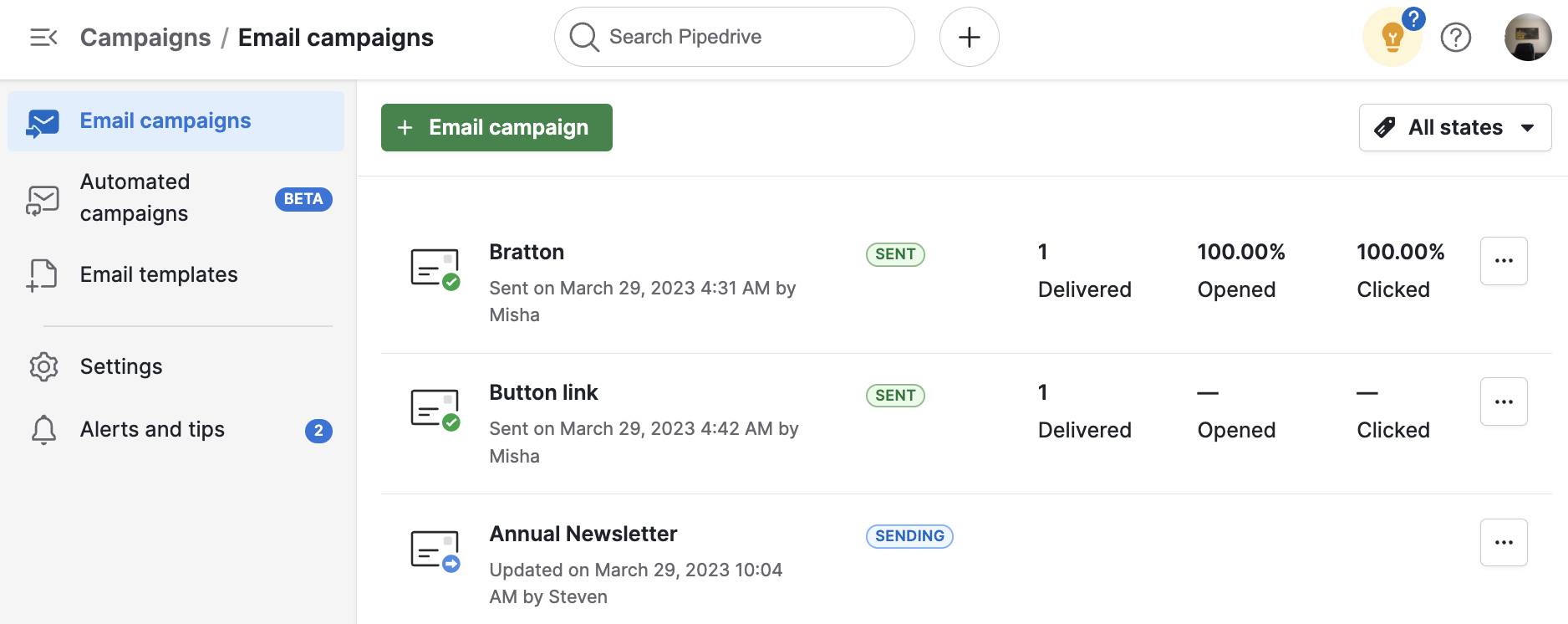
Analyzing the type of emails you create and whether recipients open them can help you send people more of what they want to see and less of what they don’t. Use the data to test and compare subject lines or call-to-action (CTA) placements that perform best.
If you’re on the Professional plan or higher, you can also access Pipedrive’s AI email writer and summarization tools, which are handy for quickly replying to responses to your campaigns.
Note: If you’ve already invested in an email marketing platform, Pipedrive also integrates with email marketing platforms like Mailchimp and Mailerlite. However, choosing a CRM with built-in email marketing can streamline your sales and marketing processes.
What others think about Pipedrive
Pipedrive is an award-winning CRM, claiming the top place in the SoftwareReviews’ Lead Management Quadrant 2023.
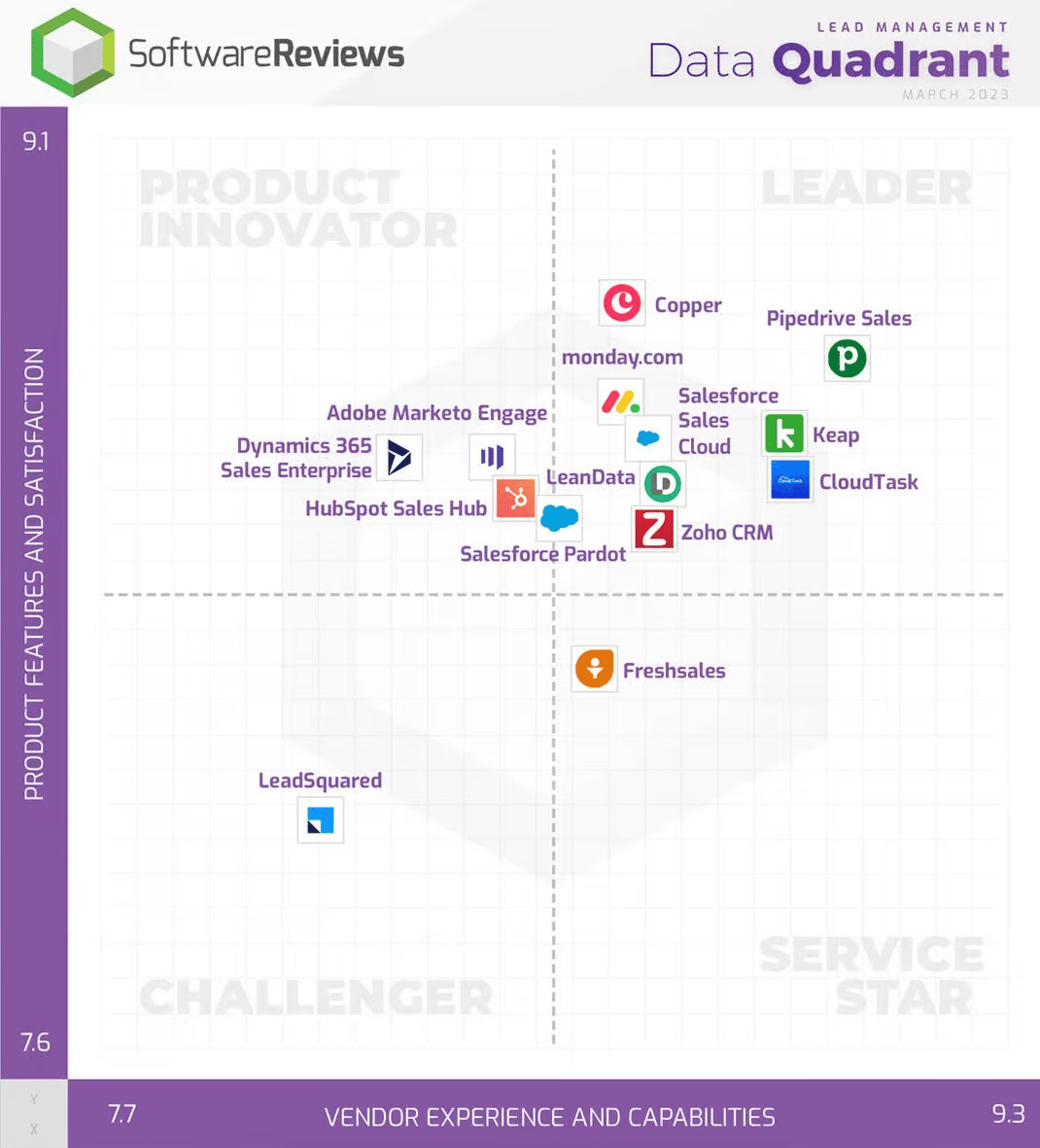
It’s also been rated as the “easiest sales tool to implement” by G2Crowd and “easiest to use” by The Motley Fool.
A recent reviewer praised Pipedrive’s customization options:
Pricing
Pipedrive has multiple pricing plans to suit businesses of all sizes. Plans range from the $14 Essential to the $99 Enterprise (all paid per user per month).
The Campaigns add-on is $13.33 per company per month when billed annually.
Note: Read our CRM comparison pages to learn how Pipedrive compares to other popular platforms.
2. HubSpot
HubSpot offers five customer management software platforms called “hubs”. The Sales Hub (HubSpot’s CRM software) has several functions for sales teams.
Here’s what the Sales Hub looks like:
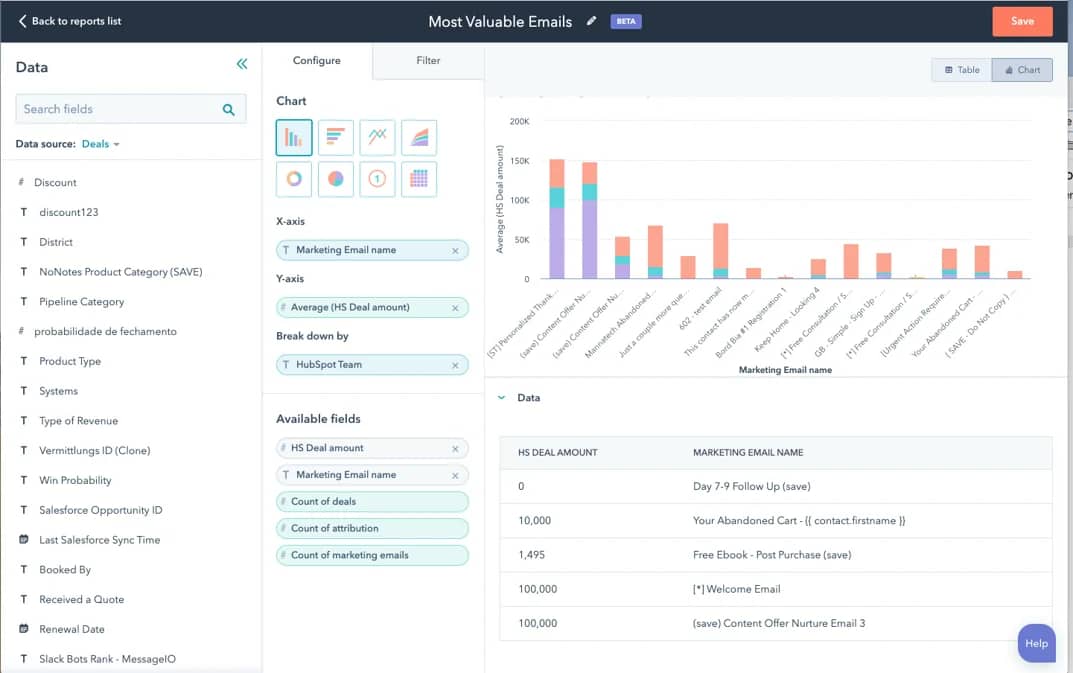
Users can access different levels for each hub according to the company’s growth stage. For example, a user might choose the Professional level for the Sales Hub but the Starter level for their Marketing Hub because they are just beginning with their email list.
Businesses can use Sales Hub to do most things other CRMs do, such as:
-
Manage and track leads and contacts
-
Visualize and manage sales pipelines
-
Automate sales tasks and workflows
-
Store and track sales documents
-
Schedule meetings with an integrated calendar
-
Create sales quotes and proposals
-
Provide sales analytics and reporting
HubSpot has a free plan, but pricing increases significantly with each tier. For example, the Professional Customer Platform plan (including a Starter Customer Platform and Professional tiers in each hub) starts at $1,300 monthly for 2000 contacts and five seats.
HubSpot’s email marketing functionality
The Sales Hub’s Professional plan includes most email marketing tools’ basic capabilities, like email scheduling, templates and automated follow-ups.
On Professional and Enterprise plans, users can use AI to write subject lines and email copy and “smart rules” to show different versions of an email to different audiences.
However, you’ll need to pay for the separate Marketing Hub to send over 2,000 emails monthly or if you need more advanced features (e.g., complex automation workflows and A/B testing).
Users also report that it’s easy to accidentally pass your HubSpot subscription limits, causing HubSpot to charge you on a higher pricing tier.
What others think about HubSpot
One G2 reviewer liked HubSpot’s interface but found some things difficult to manage:
Pricing
HubSpot’s pricing is complex. Each “department” is siloed into a “hub”, which you pay for separately, and each has its own tiered plan.
For example, when paid annually, a bundle of the Starter plans for Sales and Marketing Hubs for one user and up to 1,000 marketing contacts is $40 per month.
However, as your business and email list scales, a three-seat Professional plan for Sales and Marketing Hubs is $1,190 monthly plus a one-time onboarding fee of $4,500.
Professional and Enterprise plans also have a one-time setup fee of around $3,000 to $7,000.
As you can see, HubSpot’s pricing varies based on factors like the number of users and specific features included. For the most accurate pricing information and to pay for only what you need, you’ll likely need to contact HubSpot.
3. Zoho CRM
Zoho offers a suite of tools for business management and customer engagement, one of which is Zoho CRM.
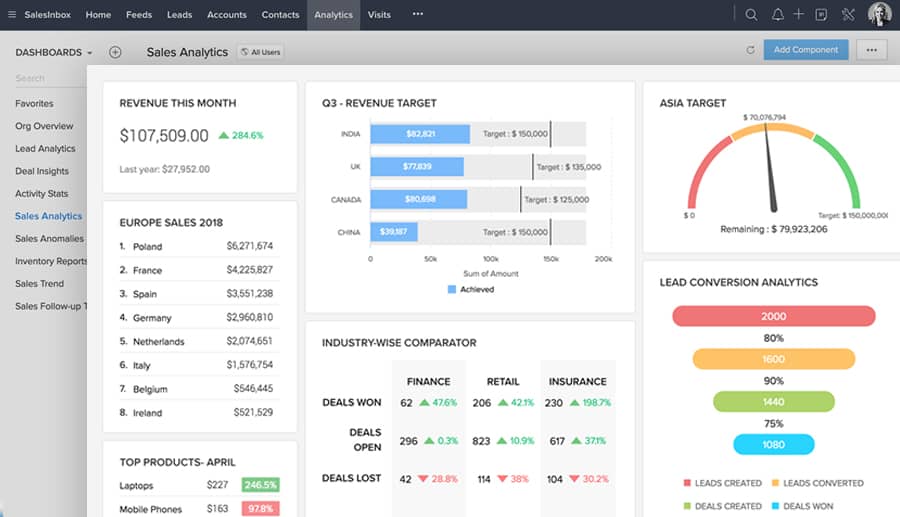
The CRM platform provides tools for tracking leads, managing contacts and automating routine tasks.
Like other CRMs in this list, users can customize and integrate it with other applications to fit specific business needs.
Zoho CRM aims to let users:
-
Organize and manage customer and lead information
-
Automate repetitive tasks during the sales process
-
Design and execute automated workflows for sales and marketing activities
-
Generate reports and visual dashboards to track sales performance
-
Access and manage the CRM database using a mobile app
Zoho CRM offers many customization options but requires time and resources to optimize.
Zoho’s email marketing functionality
The customer relationship management platform offers email marketing automation features for companies of different sizes.
All Zoho CRM plans include basic email marketing capabilities. These features allow users to send mass emails directly from the CRM and use simple templates.
For example, here’s the platform’s email analytics when creating reports for each sales rep.
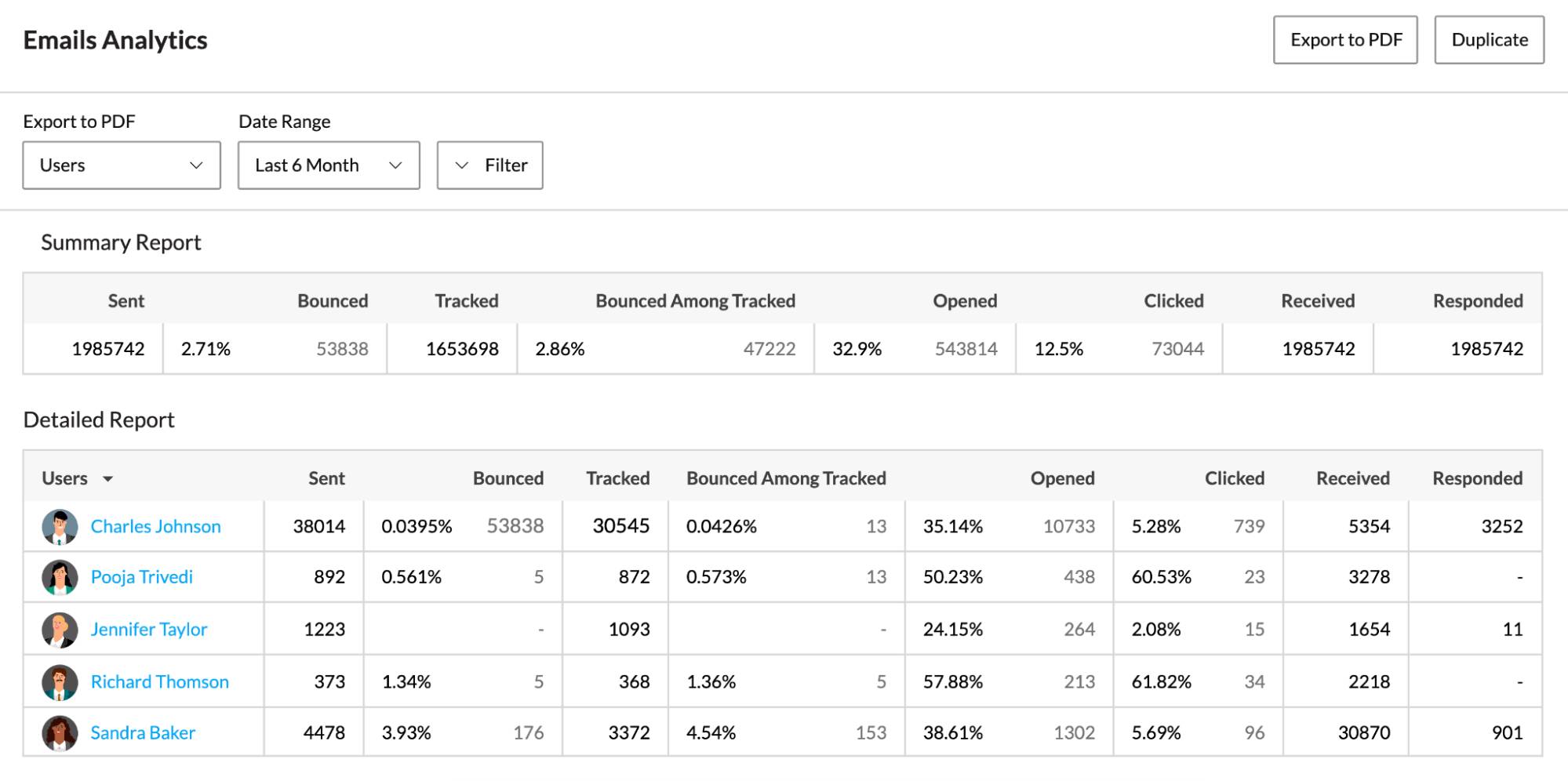
Zoho Campaigns is an email marketing software with more advanced features, such as dynamic location-based email content, reading habits and preferences.
It offers a broader range of templates, advanced segmentation, automation workflows and detailed analytics.
The free version allows up to 2,000 contacts. If you have a larger list, you’ll need to upgrade to a paid plan. You must also be on a paid Campaigns plan to access basic segmentation, drag-and-drop workflows and all templates.
What others think about Zoho
According to one G2 reviewer, some users may find Zoho One (the platform’s all-in-one package) restrictive:
Pricing
Zoho CRM has four pricing plans, each between $14 and $52 per user per month when billed annually. The Campaigns add-on ranges from free to around $14,000 (depending on the number of contacts and emails sent) for the top-level agency plan.
Free ebook: How to build a great email list
Click the button to receive 18 tips on ramping up your email list building
4. Salesforce
Salesforce offers many solutions for sales, marketing, customer service and e-commerce teams. The CRM software (built for large enterprises) is called Salesforce Sales Cloud.
Here’s an example of what the Sales Cloud dashboard looks like.
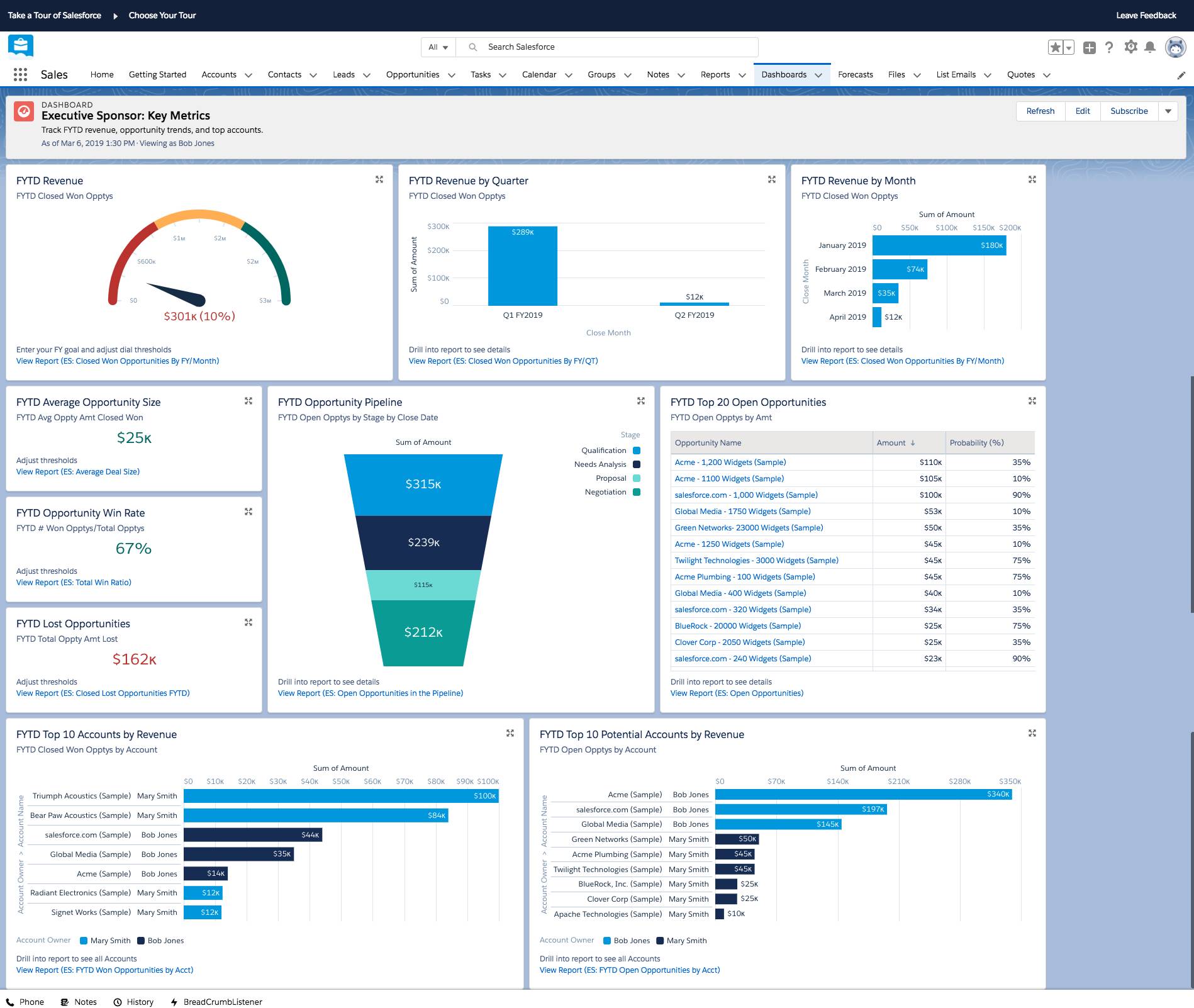
It’s suitable for smaller, fast-scaling businesses, but new users must adapt to its complex range of dashboards and features.
Salesforce’s key features claim to allow users to:
-
Capture and track contacts as they progress through the sales cycle
-
Connect email to manage communications within the CRM
-
Schedule and manage tasks, sales meetings and events
-
Create and view visual reports to assess sales rep performance
-
Automate repetitive tasks and processes
-
Predict future sales based on current data and trends
Salesforce has a steep learning curve, which can take users time to get used to. Alternatively, they can pay for specialized consultants to speed up the process.
Salesforce’s email marketing functionality
Salesforce Sales Cloud primarily focuses on sales automation and contact and customer relationship management. For comprehensive email marketing capabilities, you’ll need to buy Salesforce’s Marketing Cloud (starting at $1,250 monthly per company, billed annually).
You can integrate the two products to manage sales and marketing efforts in one place.
The email marketing tool, Email Studio, includes:
-
Advanced segmentation
-
Automation
-
Personalization
-
A/B testing
-
Detailed analytics
As with most Salesforce tools, Email Studio has a learning curve. This feature is best for teams with the time to dedicate to training and user trial and error.
Salesforce designed Marketing Cloud to complement Sales Cloud’s sales-focused features for larger-scale email marketing campaigns. However, you may also want to factor in the cost of a Salesforce consultant to ensure it’s set up correctly.
What others think about Salesforce
According to one G2 reviewer, “the downside of Salesforce is also the upside”:
Pricing
Salesforce Sales Cloud starts from the limited $25 Starter Suite up to the $500 Einstein 1 Sales plan (all per user per month, paid annually).
5. ActiveCampaign
ActiveCampaign is primarily an email marketing tool that branched into CRM in 2014. It now offers a business-to-business (B2B) CRM add-on (Sales Engagement) and a business-to-consumer (B2C) version (Pipelines).
Here’s what ActiveCampaign’s sales pipelines look like.

ActiveCampaign provides basic CRM functionality, but it also allows users to create landing pages and send text messages in addition to its usual email marketing features.
ActiveCampaign’s key features allow you to:
-
Score leads based on their interactions and behaviors
-
Organize and target contacts based on various criteria
-
Take notes within each contact and deal
-
Visualize and manage your sales process with pipelines
-
Update deals and create tasks for salespeople
-
Send automated email sequences triggered by user actions
As you can see, it has many of the features of other tools in this list. However, it has limited customizable reporting options, so if you need in-depth, customizable CRM reporting, you’ll need to look elsewhere.
It’s also less flexible than others on this list, so if your business has a unique sales process and customization is a priority, you may prefer a dedicated CRM with email marketing features.
ActiveCampaign’s email marketing functionality
As ActiveCampaign is, first and foremost, an email marketing platform, it offers tools to create, automate and optimize email campaigns. The platform also supports workflow automation for abandoned cart emails, drip campaigns and follow-ups.
ActiveCampaign’s email marketing features include:
-
A drag-and-drop email designer
-
Personalization tags and dynamic content
-
Previews of email copy and hero images
-
Advanced segmentation and targeting
-
Predictive and conditional content that adapts based on customer data
Active Campaign recently updated its plans. The Starter plan now has no segmentation features and offers limited automation steps. Users wanting those will need to start on the Plus or Pro plan (which will depend on the level of segmentation required).
ActiveCampaign offers a two-week free trial that is limited to 100 email sends.
What others think about ActiveCampaign
One G2 reviewer found that one feature was a “game changer” but that it’s over-complicated for salespeople to use:
Pricing
ActiveCampaign prices depend on the number of marketing contacts you have. If you have 5,000 contacts, they range from the limited Starter plan ($79 monthly, paid annually) to the Enterprise plan ($375 monthly, paid annually).
CRM functionality is available as an add-on. However, you’ll have to contact ActiveCampaign for pricing for both options
Recommended reading

Trigger emails: What they are and 6 examples to nurture leads
Why should you use a CRM tool with email marketing capabilities?
Many companies already use CRM systems to draw insights from customer data and automate business processes.
According to Pipedrive’s State of Sales and Marketing 2023/2024 report, 81% of respondents use CRM software with automation capabilities and over a third use email marketing automation tools.
Which automation tools or technology do you use in your role?
92% of respondents use at least one automation tool in their job role.
You can use separate customer relationship management and email marketing tools, but combining them can help your team target the right people more effectively, save time and become more productive.
Your sales team can benefit from CRM email marketing platforms in four ways.
1. Save time, money and resources
Automating email marketing campaigns (e.g., welcome emails, follow-ups and promotional offers) from your CRM platform ensures prompt communication and saves time switching between multiple platforms.
Your team can work much quicker with everything in one system. When you include email marketing in your CRM, you can automate tasks like syncing data, updating contact details and tracking campaigns in one place.
You can also save money on two standalone tools by using one CRM software with powerful email marketing features.
2. Target audience segments more effectively
A CRM system can store in-depth information about your customers and leads (e.g., contact details, purchase history and interactions).
This information allows you to segment your email list into groups with shared characteristics. For example, you may want to email all users who have been inactive for longer than three months.
Using that knowledge, you can personalize and target campaigns more accurately to improve engagement and conversion rates.
Instead of creating fresh drafts from scratch, you can pull CRM data to create personalized campaigns tailored to contacts’ needs.
Grouping contacts by in-depth customer behavior and demographic data (the collective factors influencing individual and group purchasing) can further increase the relevance and impact of marketing emails.
Here’s where you can customize automated email templates for different segments within Pipedrive.
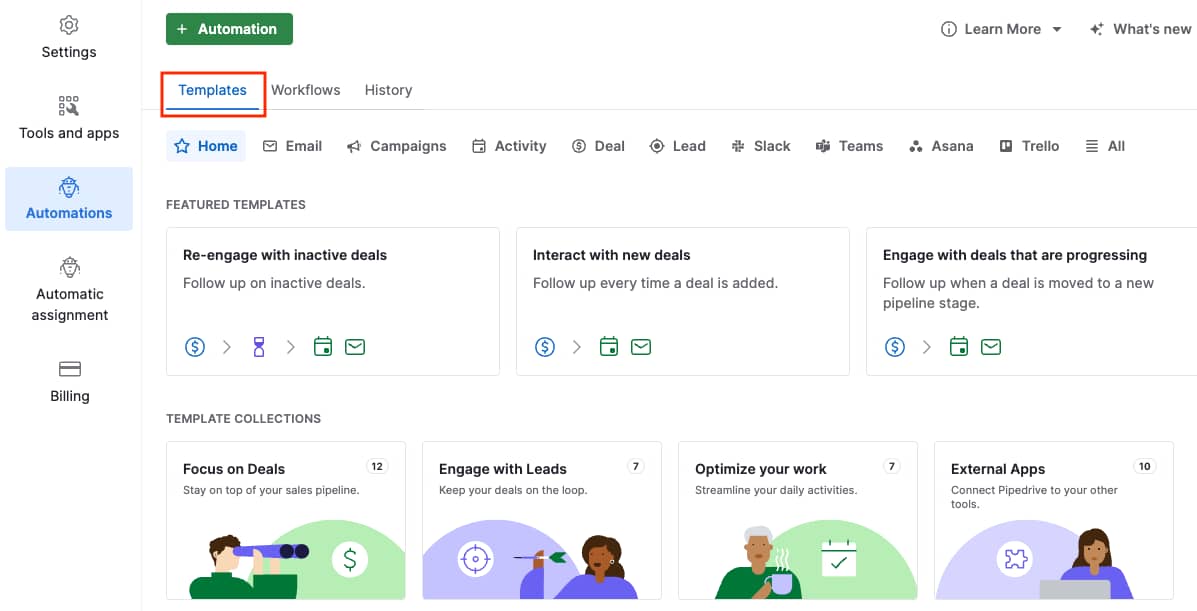
Use automations like these to send engaging interactions with minimal effort to the right groups of contacts.
3. Improve customer relationships
The better you know your customers, the stronger your relationships will be. A CRM combined with email marketing logs all customer interactions in one place and gives you a 360-degree view to communicate more effectively.
According to Qualtrics research, the happier you make customers, the more they’ll trust and buy from you.
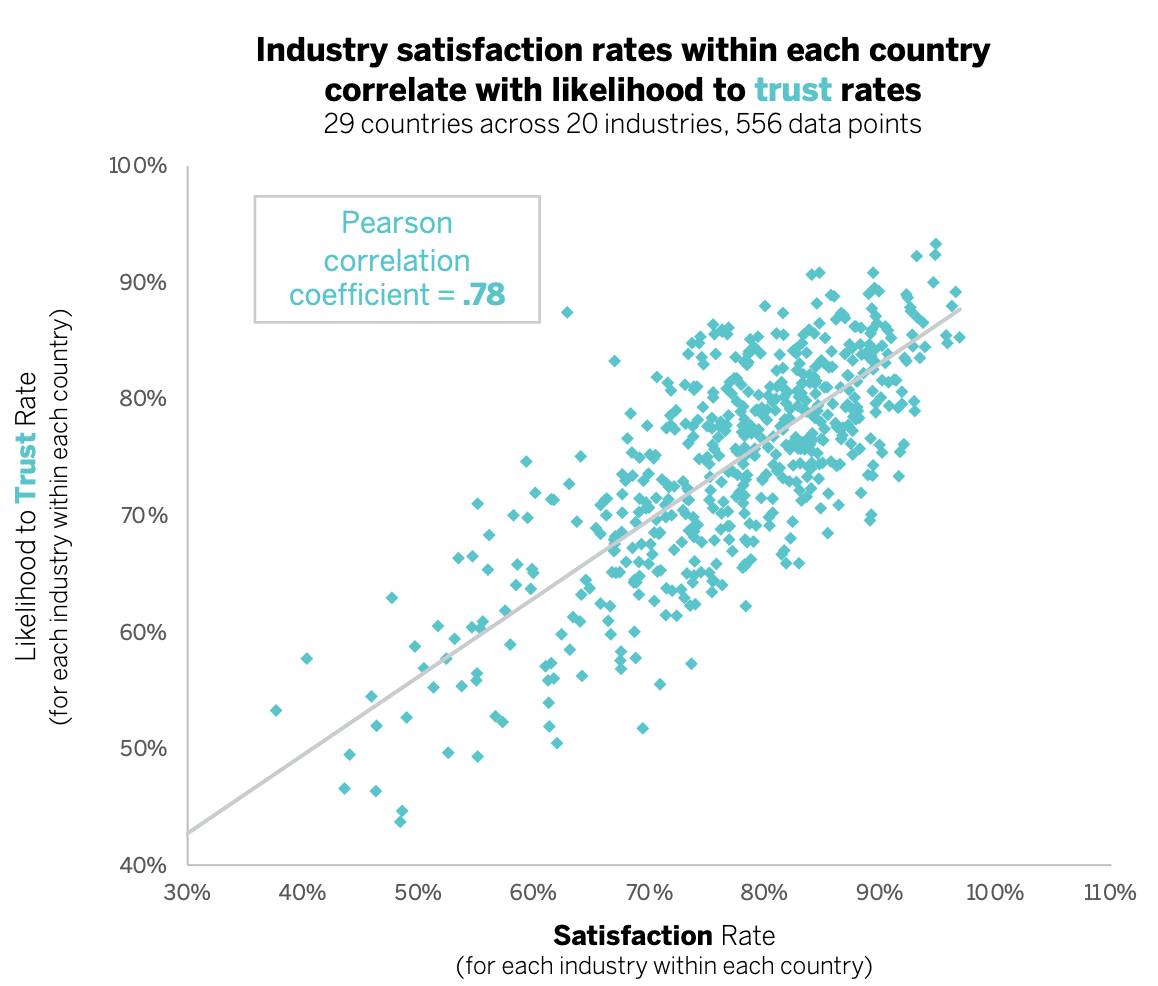
Delivering relevant and timely email content is one way to show customers you understand their wants. For example, you might email customers who previously bought your medium roast coffee beans, linking them to coffee with similar flavor notes or creamers that pair well.
Tailoring content to people’s needs at all customer journey stages can help them feel valued and more receptive to your outreach.
4. Refine future campaigns
Integrated systems let you track and analyze crucial metrics like open rates and click-through rates in one place. Your CRM automatically logs this activity, allowing you to improve segmentation and personalization when crafting emails over time.
Here’s how you could display those analytics in Pipedrive.
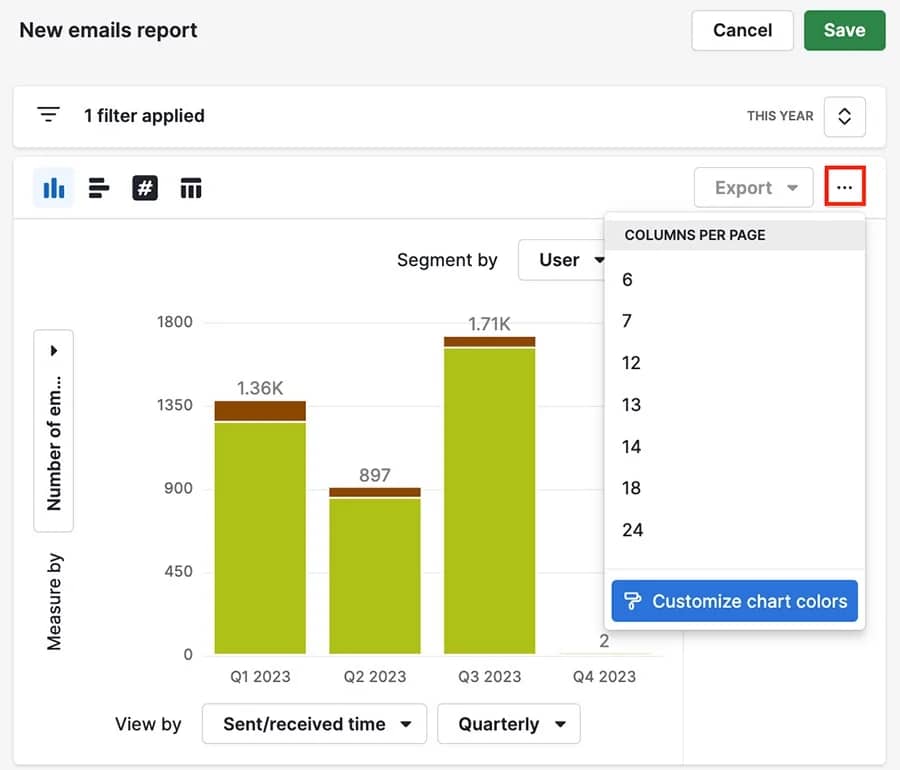
Use these insights to track your most successful content types. For example, you may notice that a particular segment of your audience loves tool comparisons.
Taking that knowledge, you may choose to send more comparisons to that segment, boosting open and click-through rates.
Centralizing all customer data makes patterns like these easier to spot. It can also ensure your email marketing campaigns target the right people with more of what they want to see.
Recommended reading

7 email strategy and email marketing tips to know in 2024
What to look for in the best CRM with email marketing software
The best CRM with email marketing software depends on the features you value, your industry, budget and company size.
Here are five crucial considerations when researching best-fit tools.
1. Essential CRM features
A CRM tool should offer a centralized database for all customer interactions (from initial contact to after-sales service). A timeline of these can help you reach out with appropriate content at the right time to move people along the sales pipeline.
A dedicated CRM should also offer features like:
Standalone email marketing tools typically focus on executing campaigns. A CRM platform can do that while managing the entire customer lifecycle.
2. Artificial intelligence (AI)
AI is currently one of the most talked-about technologies in sales and marketing. Tools with these capabilities can help you automate routine tasks to focus your time on high-priority activities that lead to sales.
Pipedrive offers several AI features, including AI Sales Assistant, which can help you close more deals by identifying real-time trends and patterns. The intelligent automation constantly analyzes your deals and pipeline and sends notifications with suggested actions.
For example, the AI recommends sales opportunities that are likely to close and what you can do to get them over the line.
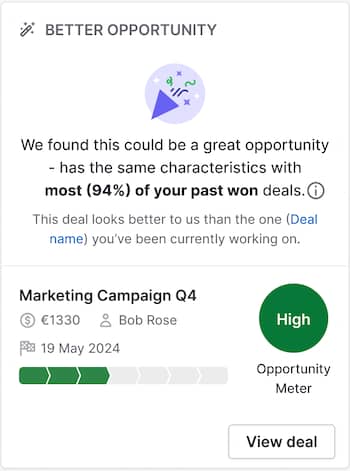
Pipedrive also offers an AI-powered Marketplace search to help you find the most relevant third-party integrations. Instead of matching the tool name exactly, use natural language prompts (e.g., “create proposal documents”) to help you achieve your goals.
We also have a deal summarization tool (testing in beta) that produces AI-generated deal status summaries.
Use it to quickly overview each deal and relevant interactions, then plan the best next steps with your team.
3. A smooth user experience
A seamless user experience (UX) is crucial if you want an intuitive CRM that your team can easily navigate.
It reduces the learning curve for new users and allows them to perform tasks with minimal effort. Over time, this can minimize data entry errors and boost team productivity.
For example, Pipedrive has a user-friendly interface that’s easy to set up and customize.
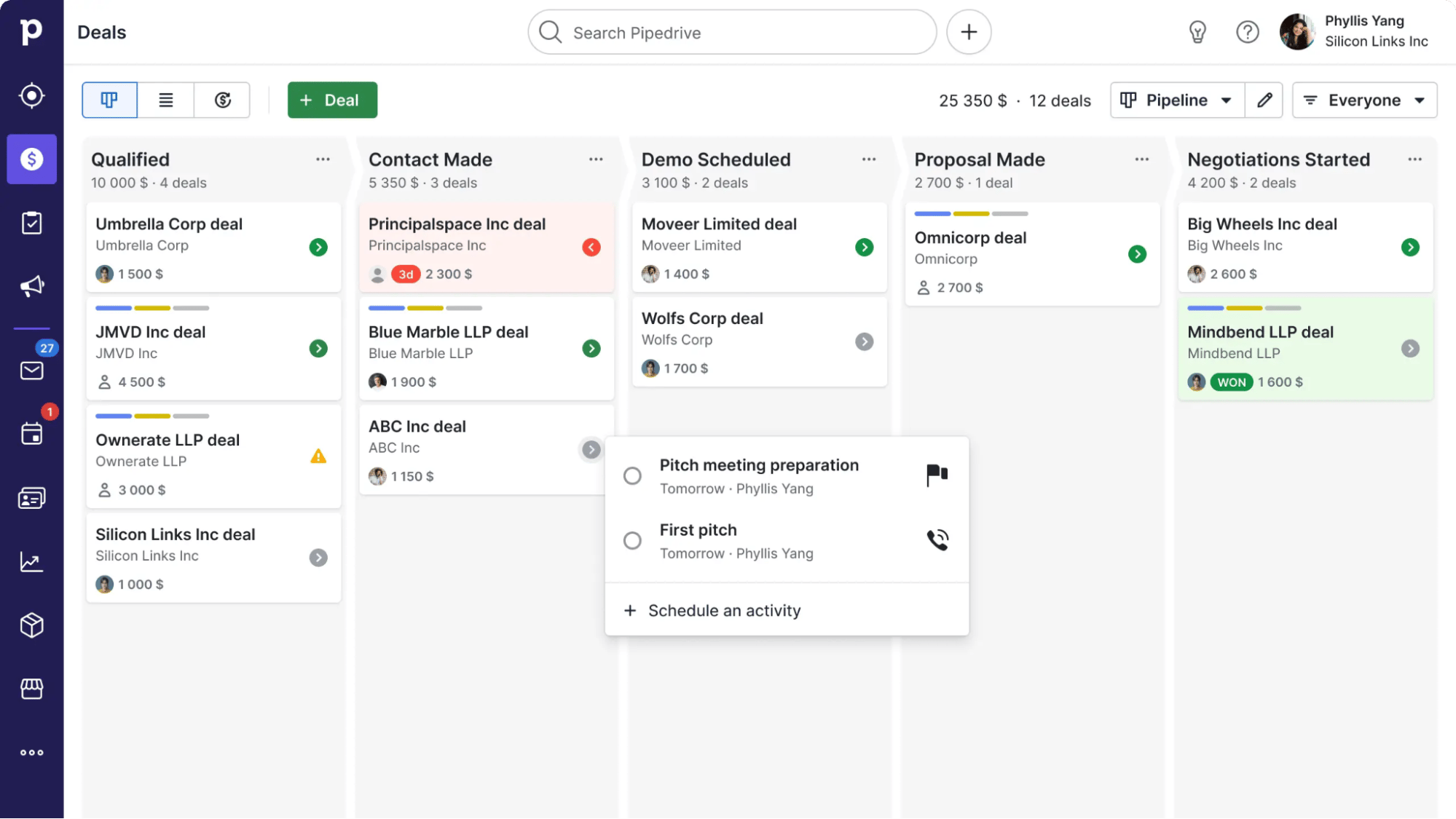
The dashboard design highlights the most crucial information to give you an accurate overview at all times.
A CRM tool with a smooth user experience can also include:
-
Responsive design that works on a range of devices and screen sizes with fast loading times
-
A clear visual hierarchy (the design organizes information logically) with colors, fonts and graphics that fit together
-
Minimal steps to achieve goals (e.g., adding a new contact)
-
Customer support that provides timely and clear responses
-
The ability to customize your dashboards based on personal preferences
If a CRM’s interface makes it easy to navigate and complete actions, it’s worth considering for daily use.
4. Email templates
Pre-designed templates allow users to quickly create campaigns without starting from a blank page. Instead of struggling with creativity, salespeople and marketers can create polished designs in far less time.
You can also choose those that best fit your business needs (e.g., sending resources to a contact who contacted you after a campaign).
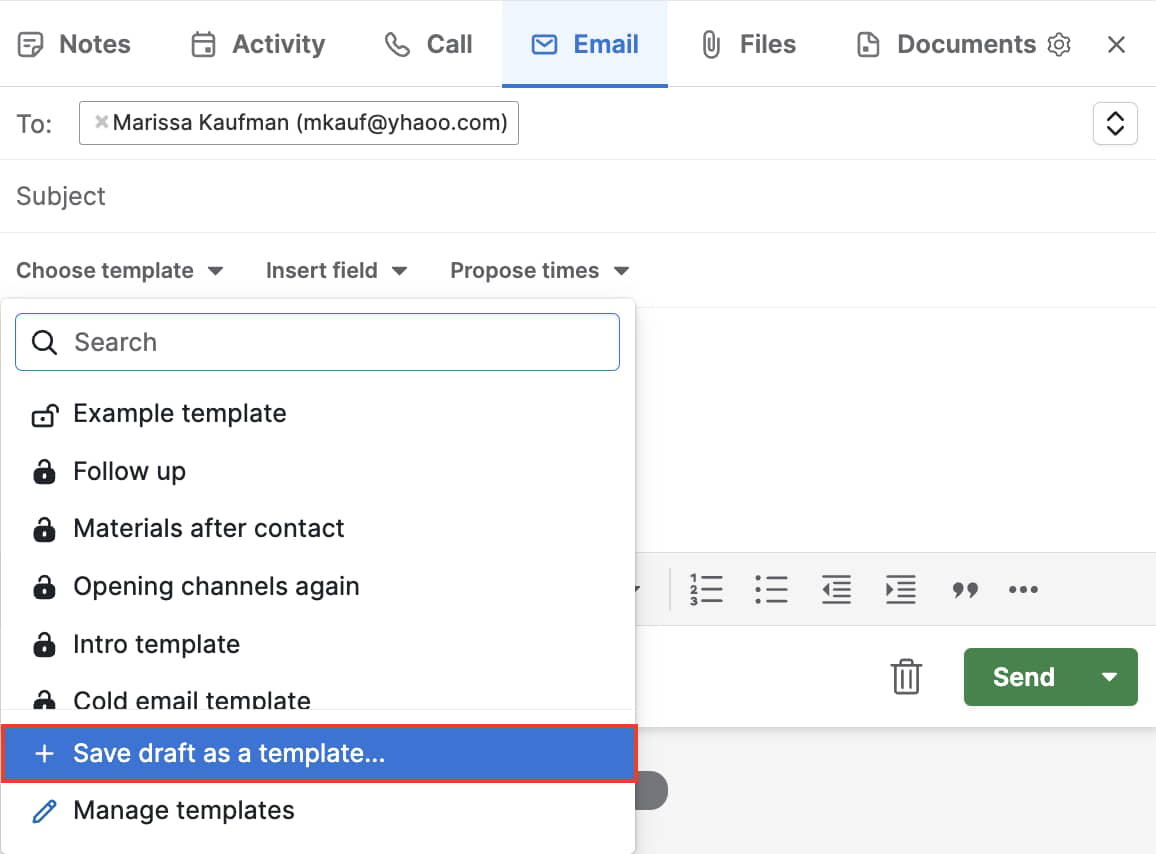
An intuitive CRM solution like Pipedrive can also give you access to drag-and-drop functions that make customizing templates frictionless.
Instead of spending time or money on coding, you can structure content to lead readers down the page and drive action.
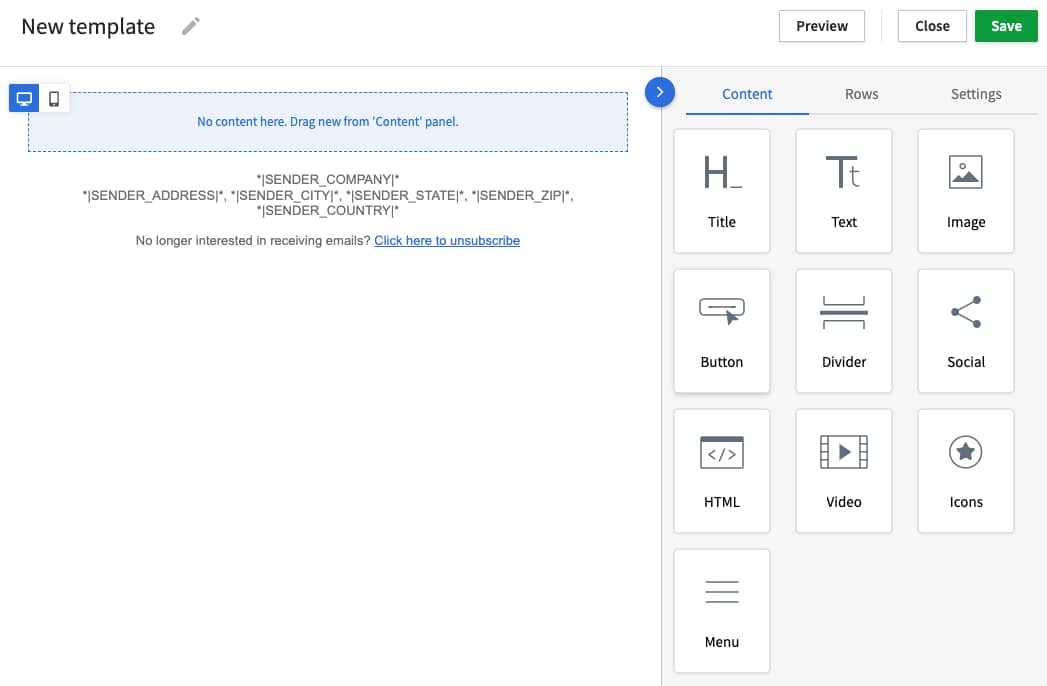
Templates streamline the process and allow you to maintain a consistent look across all outreach.
Building brand recognition in people’s inboxes also helps them recognize your company through its attributes (e.g., colors, fonts and tone) and grow to trust you.
You can also use A/B testing to compare the effectiveness of different designs. Consider creating and sending similar content to those that result in higher click-through and conversion rates.
5. Campaign reporting capabilities
Campaign reporting capabilities allow you to optimize your email marketing campaigns to improve engagement.
Ensuring your chosen CRM has dedicated email analytics lets you quickly pinpoint key insights and assess your performance.
To measure how engaging your campaigns are, use quantifiable metrics like:
-
Open rates. Tracking how many people open your emails indicates deliverability and initial engagement.
-
Click-through rates. Learning how many recipients click on links indicates content engagement and CTA effectiveness.
-
Conversion rates. Understanding the percentage of recipients who completed a desired action (e.g., bought something or filled out a form) after clicking on a link in your email indicates content quality.
-
Delivery and bounce rates. Working out the percentage of emails that were or weren’t delivered to recipients’ inboxes (e.g., due to invalid email addresses) helps you unearth potential issues.
-
Unsubscribe rates. Seeing how many recipients opt out of receiving future emails measures the health of your email list and the effectiveness of your content.
-
Device and browser analytics. Knowing the devices and browsers people use to open your emails helps you optimize design and responsiveness.
Tracking email performance helps your sales and marketing teams identify promising potential customers. Using that information, they can target leads with content that will interest them and nudge them along the sales funnel.
Recommended reading

Nine key email marketing metrics and what they tell you about your campaigns
How to make the most of email marketing automation within your CRM software
You can streamline your email marketing efforts by harnessing the power of automation within your CRM software.
Here are six top tips for using CRM software with email marketing functionalities:
-
Take personalization further. Use CRM data to target recipients with personalized content they’ll likely enjoy (not just their first names).
-
Ensure emails sound human. Tweak templates and experiment with different subject lines, CTAs and content formats to identify what resonates best with various groups.
-
Adjust strategies over time. Set benchmarks and then use analytics to gain insights into subscriber behavior and campaign effectiveness. Use these results to tweak future emails for better results.
-
Set up behavioral triggers. Send automated emails triggered by specific actions or behaviors (e.g., someone visits a product page but doesn’t buy). Tailor content and timing to these events, so they drive action (e.g., “Take another look” alongside the product page).
-
Ensure mobile optimization. A significant portion of people access emails on mobile devices. Use mobile-friendly, responsive email templates to improve open rates and boost reading time.
-
Focus on deliverability best practices. Maintain a clean contact list and avoid spam triggers (e.g., all caps in subject lines and excessive punctuation).
Use these six tips to get the most value from your chosen CRM and email marketing tool.
Recommended reading

5 high-converting B2B email marketing ideas [with samples]
Best CRM with email marketing FAQs
Final thoughts
The best CRM with email marketing tool for you may not be the same as someone else’s choice. Each of these tools offers unique features that can help businesses in different ways.
The right platform will help you manage customer relationships and create more effective email marketing efforts with its insights.
Try a few options to find your ideal choice and see which best suits your company’s needs and goals. Start your search with Pipedrive’s 14-day free trial.
If Pipedrive is of interest and you'd like more information, please do make contact or take a look in more detail here.
Credit: Original article published here.
